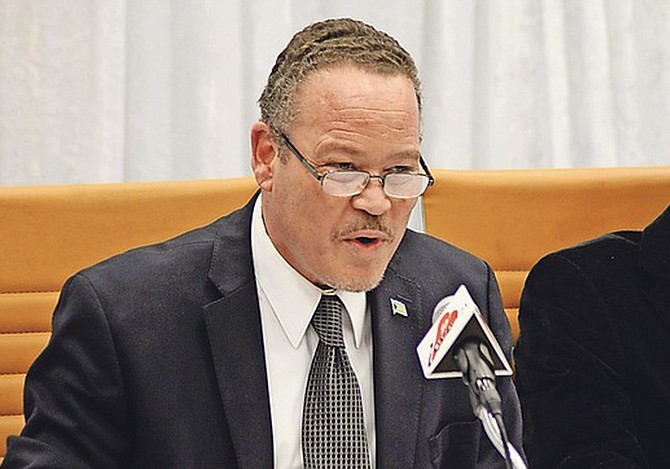By NEIL HARTNELL
Tribune Business Editor
nhartnell@tribunemedia.net
The Bahamas will not be considered for removal from a 12-strong list of nations with weaknesses in their anti-financial crime defenses until it completes its "action plan" by this September.
Carl Bethel QC, the attorney general, told Tribune Business that the Financial Action Task Force's (FATF) Friday statement acknowledged that The Bahamas had "made significant progress" in addressing the deficiencies that resulted in this nation being placed on its monitoring list in October 2018.
He explained, though, that The Bahamas was still working its way through a process that requires it to complete an "action plan" laying out a strategy and road map for how it will tackle the seven issues identified by the FATF, the global standard setter in the fight against money laundering and all financial crime.
The Bahamas' "action plan" is due to be completed in time for the FATF's next conference in October, and Mr Bethel said that should it be assessed positively then the organisation may elect to visit this nation to ensure the steps outlined are being implemented on the ground before there is any escape from the monitoring list.
"We're still in the same status quo because we're completing our action plan," Mr Bethel told Tribune Business of The Bahamas' standing with the FATF. "No assessment will be made by the plenary until such time as the action plan is completed in September.
"It's not due to be completed until then, and they will not consider it beyond the fact they're observing we're making significant progress. September is the deadline on the action plan, October will be the plenary. They'll assess our compliance with the action plan."
By then The Bahamas will have been on the FATF "monitoring list" for one year. Mr Bethel said a "positive assessment" of the "action plan" would lead to the FATF then deciding whether to "conduct an on-site visit to The Bahamas to check for quality and consistency, if you will". Only then would the body decide if this nation's removal was warranted.
Emmanuel Komolafe, a Bahamas-based governance risk and compliance specialist, last night told Tribune Business that the potential timeline for The Bahamas' removal could be gauged by how Serbia escaped the monitoring list at last Friday's FATF plenary.
The FATF announced a "site visit" to Serbia in February 2019, following the Balkan nation's completion of its action plan, and Mr Komolafe said similar language relating to The Bahamas after this October's conference would be an indication this nation might be removed come 2020 - especially since Serbia was added six to eight months ahead of it.
"The next update in October will give us an indication of when we will come off the list," he added. "The latest one didn't give any indication we will be off in October. If what the attorney general says holds true, we can expect they will give us a better update by October and be off the list by February 2020."
Mr Komolafe said the FATF's latest statement was slightly more upbeat on The Bahamas' progress, referring to its implementation of the Beneficial Ownership Act as opposed to its passing into law in the February 2019 update.
"The major difference between both statements is the progress from enactment to initial implementation of the Beneficial Ownership law and the bringing into force of the Anti-Terrorism Regulations," Mr Komolafe said.
"What the FATF did not seem to have opined on or provided an update on is the progress we have made vis-à-vis the seven-point action plan outlined in February and June 2019 respectively.
He added: "As the seven-point action plan is in the public domain, it may be in our interest as a jurisdiction to outline our efforts and progress in implementing this action plan. It is common knowledge that The Bahamas has done much to address identified deficiencies, and these ought to ultimately translate into our removal from the FATF's adverse listing.
"The Bahamas' regulatory framework.. has been enhanced, and the compliance burden as well as cost increased on the financial services industry, with the actions taken to date. Due credit should be given, and these should translate into success. In this regard, meaningful progress and success will be measured by our removal from the FATF list."
The US and UK advisories, warning their institutions to apply greater scrutiny to clients and transactions originating from The Bahamas, resulted directly from The Bahamas' inclusion on the FATF listing.
"The industry is eager to have this matter put behind us as it is not good for business," Mr Komolafe said yesterday. The enhanced scrutiny and additional due diligence that inclusion on the FATF list attracts is unfair and does not help us as an International Financial Centre. It is an unwanted baggage that financial institutions operating within, and from within, The Bahamas have to carry."





Comments
Use the comment form below to begin a discussion about this content.
Sign in to comment
OpenID